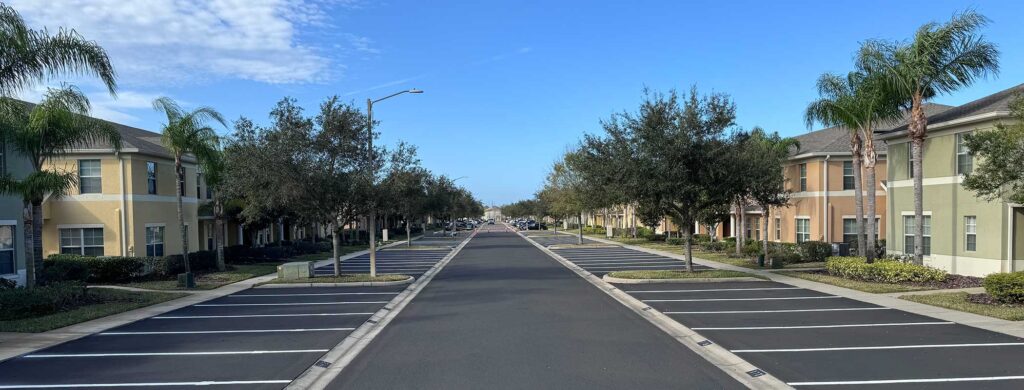Driveway sealcoating is a critical maintenance job that provides elements protection, extends service life and preserves the fresh new appearance of an asphalt pavement. Nevertheless, a question we hear from clients time and time again is: “How often do you sealcoat your driveway?” There are a few different things that go into the answer, such as your climate, use and condition of your driveway. In this guide, we will discuss what is the ideal driveway sealcoating frequency and ways to figure out when you need a new layer.
Understanding the Purpose of Driveway Sealcoating
Before diving into how often you should sealcoat your driveway,. It’s important to understand why sealcoating is necessary in the first place. Sealcoating serves multiple purposes:
- Protection from Weather: It acts as a barrier against rain, snow, and UV rays, which can cause cracks, fading, and deterioration.
- Prevention of Oil and Chemical Damage: Sealcoating prevents oil, gasoline, and other chemicals from penetrating the asphalt and causing damage.
- Enhanced Appearance: A freshly sealcoated driveway looks clean, smooth, and enhances your property’s curb appeal.
- Extended Lifespan: Regular sealcoating can significantly extend the life of your driveway by protecting it from the wear and tear of daily use.
Factors That Influence Sealcoating Frequency
The frequency of driveway sealcoating depends on various factors. Here are some key considerations:
- Age of the Driveway
- New Driveways: For a newly paved driveway, it’s recommended to wait 6 to 12 months before applying the first sealcoat. This allows the asphalt to fully cure and harden.
- Older Driveways: For older driveways, the frequency of sealcoating depends on the condition of the asphalt and previous maintenance.
- Climate and Weather Conditions
- Harsh Climates: If you live in an area with extreme weather conditions—such as freezing winters, hot summers. Heavy rainfall—your driveway may need to be sealcoated more frequently. Harsh climates accelerate wear and tear on the asphalt.
- Mild Climates: In areas with mild weather, your driveway may not need sealcoating as often.
- Traffic and Usage
- High Traffic: Driveways that experience heavy traffic, such as multiple vehicles, heavy machinery, or frequent turning, will wear out faster and require more frequent sealcoating.
- Low Traffic: A driveway with minimal usage may need sealcoating less frequently.
- Previous Maintenance
- Regular Maintenance: If you’ve been diligent about sealcoating your driveway regularly, you may be able to extend the time between applications.
- Neglected Driveways: If your driveway hasn’t been sealcoated in several years, it may need an immediate application and more frequent maintenance going forward.
How Often Should You Sealcoat Your Driveway?
Based on the factors mentioned above, here are general guidelines for how often you should sealcoat your driveway:
- Every 1-2 Years: Driveways in harsh climates, with high traffic, or in need of repair may benefit from sealcoating every 1 to 2 years. This frequent maintenance helps protect the asphalt from damage and keeps it looking its best.
- Every 2-3 Years: Most homeowners find that sealcoating every 2 to 3 years is sufficient. This interval strikes a balance between maintaining protection and avoiding over-application.
- Every 3-5 Years: In mild climates or for driveways with minimal traffic, sealcoating every 3 to 5 years may be adequate. However, you should monitor the condition of the asphalt and apply sealcoat sooner if you notice signs of wear.
Signs That It’s Time to Sealcoat Your Driveway
If you’re unsure whether your driveway needs sealcoating, here are some signs to look for:
- Fading Color: If your driveway has lost its deep black color and appears gray or dull, it’s a sign that the sealcoat has worn away, and the asphalt is exposed to the elements.
- Cracks and Potholes: Small cracks or potholes are early indicators that the asphalt is deteriorating. Sealcoating can prevent these issues from worsening.
- Rough Surface Texture: A rough or uneven surface may indicate that the previous sealcoat has worn off. The asphalt needs a fresh layer of protection.
- Water Pooling: If water no longer drains off your driveway properly and pools in certain areas. It’s a sign that the sealcoat has worn away, and the surface needs attention.
Tips for Maintaining Your Driveway Between Sealcoatings
To extend the life of your sealcoating and keep your driveway in good condition, follow these maintenance tips:
- Regular Cleaning: Sweep and wash your driveway regularly to remove dirt, debris, and stains.
- Prompt Repairs: Address any cracks or potholes as soon as they appear to prevent further damage.
- Avoid Harsh Chemicals: Keep oil, gasoline, and other harsh chemicals off your driveway, as they can break down the sealcoat and damage the asphalt.
- Protect Edges: Be careful with lawn equipment and shovels near the edges of your driveway to avoid chipping the sealcoat.
It is also an important part of maintaining your asphalt and guaranteeing a long lasting life for it. The frequency with which you should sealcoat a driveway depends largely. The weather in your region as well as how much traffic and wear it takes. Simply by keeping an eye on the condition of your pavement and sticking to some general rules, you can often gauge when it may need a new sealcoat. One of which is that when you get your driveway sealcoated, it keeps it looking good and helps prevent the regular aging process as well as damage to save unnecessary costs on repairs later down the road.
About the author:
Express Asphalt Solutions, your premium asphalt business in Florida. With the focus on quick, affordable, and top-notch services. We specialize in asphalt paving and repair, sealcoating, as well as parking lot striping. Our skilled team ensures your parking areas are safe, organized and visually appealing. From commercial properties to residential communities, we cater to all your asphalt needs with precision and care. Enhance the functionality and appearance of your parking spaces with our quality solutions. Contact us now for a free quote and experience the different Express Asphalt Solutions can make!
See some of our Clients review here
"*" indicates required fields




